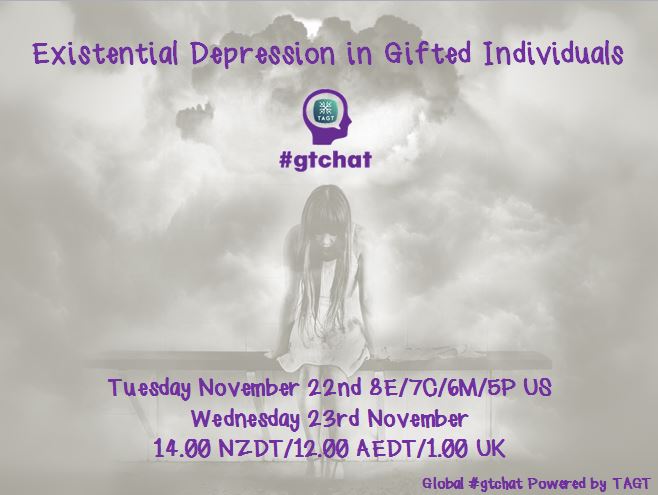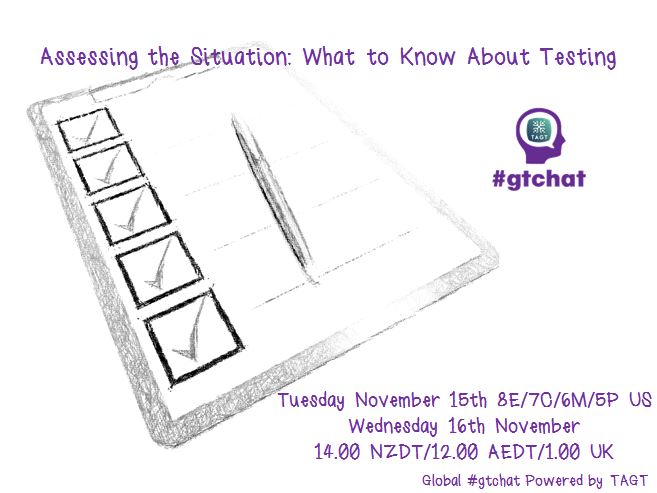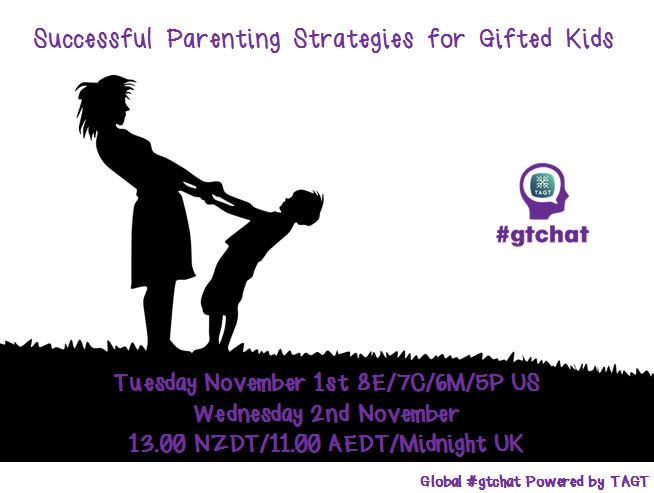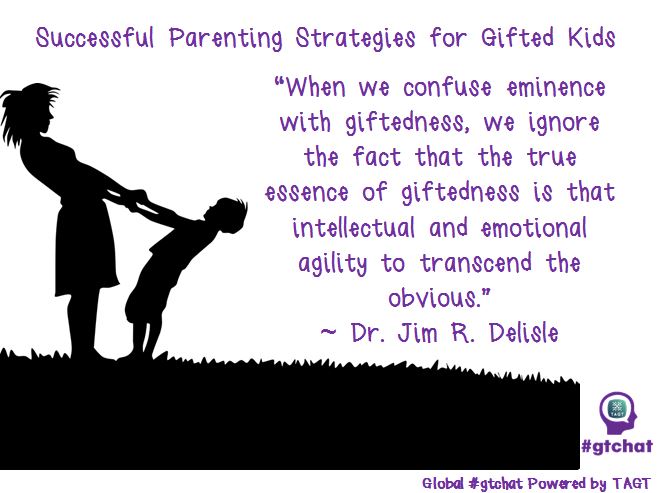
Existential depression is a depression that arises when an individual confronts certain basic issues of existence.(Webb) Classic symptoms of existential depression include isolation, alienation, meaninglessness and lack of focus and direction.
At this week’s chat, we were excited to welcome Dr. James T. Webb to Twitter as well as our chat. Dr. Webb has written extensively about existential depression. His contributions were greatly appreciated. His book, Searching for Meaning is listed below.
“Psychologists and philosophers have known about existential depression for centuries. Only recently have folks tied it in with gifted. That makes sense, though. You have to be bright in order to realize the absurdities of societies.” ~ Dr. James T. Webb
Existential depression can be caused by personal, environment & professional mismatches that is accompanied by a sense of hopelessness. For gifted young adults, an inability to find inspiring mentors & coaches to identify with can lead to existential depression.
“Existential depression may be caused by a traumatic event OR simply by awakening to our seemingly arbitrary existence. It’s important to know that existential depression can occur in very young gifted children as well as individuals of all ages.” ~ Dr. Marianne Kuzujanakis
Gifted individuals are more prone to existential depression because it requires substantial thought and reflection to occur. (Webb) A predisposition to existential questioning from an early age, increases the potential for existential depression in gifted adults. They can seek out their ‘tribe’; look for those who share their need for deep thinking. We were reminded by Dr. Webb that “existential depression can spur you to change in great ways – disintegration that can become positive. It is why we need to be close, kind, and caring toward each other. Shared idealism gives us purpose, I think.” Indeed … why humanity chooses to go on in the face of seemingly insurmountable odds.
How can parents help their children cope with existential depression? Parents need to understand that their child’s feelings are real and not to be minimized. They should help them know that they are not alone and there are ways to manage feelings. Dr James Webb suggests the importance of ‘touch’ for children grappling with existential concerns … daily hugs! Children experiencing existential depression should be encouraged to utilize bibliotherapy to learn how others have coped.
“Parents can provide their children a safe place to express their concerns, fears and emotions. Encourage their abilities and interests. Help them find peers.” ~ Jo Freitag, Gifted Resources
There are several things teachers can do if they suspect a child may be experiencing existential depression. As with parents, teachers should not ignore the signs of existential depression or try to minimize child’s feelings. When dealing with students with existential depression, guidance counselors & support staff should be utilized.
We highly recommend viewing the transcript of this week’s chat for a more extensive review of the topic which may be found at Storify.

Global #gtchat Powered by the Texas Association for the Gifted and Talented is a weekly chat on Twitter. Join us Tuesdays at 8E/7C/6M/5P in the U.S. and Wednesdays at 14.00 NZST/12.00 AEST/1.00 UK to discuss current topics in the gifted community and meet experts in the field. Transcripts of our weekly chats can be found at Storify. Our Facebook Page provides information on the chat and news & information regarding the gifted community. Also, checkout our Pinterest Page and Playlist on YouTube.
 About the author: Lisa Conrad is the Moderator of Global #gtchat Powered by TAGT and Social Media Manager of the Global #gtchat Community. She is a longtime advocate for gifted children and also blogs at Gifted Parenting Support. Lisa can be contacted at: gtchatmod@gmail.com
About the author: Lisa Conrad is the Moderator of Global #gtchat Powered by TAGT and Social Media Manager of the Global #gtchat Community. She is a longtime advocate for gifted children and also blogs at Gifted Parenting Support. Lisa can be contacted at: gtchatmod@gmail.com
Links:
Searching for Meaning Idealism, Bright Minds, Disillusionment & Hope (Amazon)

When Bright Kids Become Disillusioned
The Gifted Kids’ Survival Guide: For Ages 10 & Under (Amazon)
Existential Depression in Gifted Individuals
Gifted, Sensitive, In Need Of Meaning: Existential Depression
Of Giftedness, ADD, Depression & Being an HSP
Existential Crisis (Wikipedia)
Rethinking Depression: How to Shed Mental Health Labels & Create Personal Meaning (Amazon)
The Experience of Emptiness (Amazon)
Existential Depression: The Disease of the Gifted & Talented
2008 Dabrowski Congress Proceedings (pdf)
Exploring the Duality of the Gifted Teen
Gifted Adults & Relationships: Ten Sources of Conflict
Your Rainforest Mind: A Guide to the Well-Being of Gifted Adults & Youth

Dabrowski’s Theory & Existential Depression in Gifted Children & Adults
Existential Psychotherapy (Amazon)
Cybraryman’s Mental and Emotional Health Page
What Do We Know about Suicide? Not Nearly Enough
Photo courtesy of Pixabay CC0 Public Domain
Graphic courtesy of Lisa Conrad.


